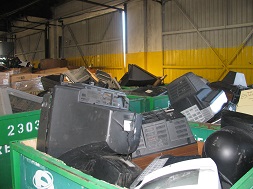Electronic Waste Recycling
More Options
Donating to charity
You may have decided to find a school or local charitable group to donate your working computers, either out of benevolence or to get an income tax deduction (or both). In some cases this may be worthwhile. You may find it's better for all involved to send it to a recycler, though, and make your donations another way, especially if you have more than just a few computers to give away. Here's why.
First, even working equipment won't be useful if it's obsolete or nearly so, or if it needs a tune-up that might prove more work than it's worth.
Software licensing is also a consideration. If you do not have the original licenses for the software installed on the computer, if your licenses are not valid outside your organization, or if you were using unlicensed (pirated) software, then the school or charity may be unable to accept the donation, or may have to pay for new licenses.
Lastly, charities may not be equipped to meet your requirements for accountability reporting and data destruction.
Responsible recycling
Some companies claim to recycle equipment but actually send the unusable or broken items to a landfill, or sell it to merchants overseas. It's morally worse, of course, if they collected fees from you or subsidies from the government to perform the recycling activities they failed to do.

CRT monitors and televisions awaiting recycling in Paramount, Calif., December 31, 2014
Also, when equipment is to be disassembled or melted, this should be done in a properly constructed facility with appropriate safety measures to prevent poisoning the workers and the local environment. When companies in the United States send equipment to countries where it is easier to extract raw materials without observing modern safety practices, this can result in workers being exposed to toxic chemicals and fumes, and certain geographical areas in poor countries can be made uninhabitable due to improper disposal of the waste produced.
Responsible recycling refers to the commitment of a recycling company not to engage in the practices described above. A responsible recycler will keep all equipment it collects out of landfills, and will not melt it down in an unsafe manner nor send it to any merchants who will.
If you are interested in sending your disused IT equipment to responsible recycling agencies, what can you do? Is it enough to send it to a recycler that claims to be "responsible"?
Unfortunately, we should all know that in this cold world, even if a company has a nice website loaded with "green" logos and all kinds of promises about environmental responsibility, this can mean nothing if the company is run by a bunch of liars. A high-profile company in Colorado made responsible recycling a big selling point, then got caught shipping a giant container of CRT monitors to a remote province in China, for the reasons described above. And, for several years, a mountain of electronics, including poisonous old television tubes, piled up in Arizona, from a California recycler who may have received the government subsidies mentioned earlier in this article to properly recycle that equipment.

The Basel Action Network (BAN) is a group of environmental activists who offer a certification process by which an electronics recycling company can confirm compliance with the responsible recycling standards set by BAN under their e-Stewards program. While J.D. Fox Micro does not explicitly endorse BAN or its activities, it does seem reasonable to assume that any company that has made the effort to get certified by BAN for responsible recycling can be considered your best bet for ensuring your recycled equipment does not go to a landfill or end up poisoning children in foreign lands.
For more information on the Basel Action Network and the e-Stewards standard, visit their websites at https://ban.org and http://e-stewards.org.
Electronic Waste Recycling
Table of Contents